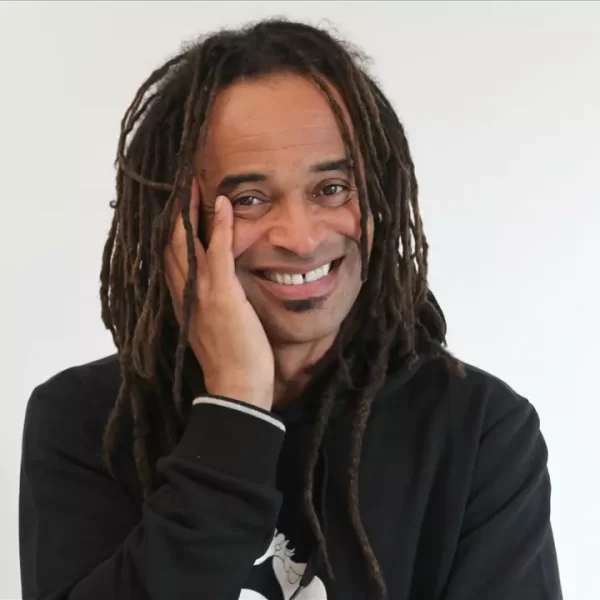BIGSONG:

While much of the globe remembers Yannick Noah as the dreadlocked tennis champion who claimed the 1983 French Open title, in French-speaking Europe he is also a major pop music star, particularly in his native France. Of French and Cameroonian parentage, he launched his recording career with the 1990 dance-pop single “Saga Africa,” which reached number two in his home country. His debut album, Black & What! , followed in 1991. Taking influence from the music and culture of his African heritage, Noah’s third full-length, 2000’s Yannick Noah, marked his debut at number one in France, a position he would reclaim several more times. Meanwhile, in 2005, he was inducted into the International Tennis Hall of Fame. “Aux Arbres Citoyens” topped the singles chart in 2007, and back on the French album chart, Noah had his fifth number one with 2012’s Hommage, a tribute to Bob Marley. Still charting nearly 30 years after his recording debut, his 12th long-player, Bonheur Indigo, reached number five in 2019.
The son of famed footballer Zacharie Noah, Yannick was born in Sedan, France, on May 18, 1960, but spent much of his childhood in his father’s native Cameroon. Despite his affection for Jimi Hendrix and Bob Marley, Noah chose to pursue sports over music, proving especially gifted as a tennis player. In time, he captured the attention of American tennis legend Arthur Ashe, who in 1971 installed him in Nice’s French Tennis Federation development program. Upon turning professional in 1977, it took Noah just a year to claim his first singles title in Manila. A flashy player renowned for his blistering forehand, he achieved immortality in 1983 when he defeated reigning champion Mats Wilander to become the first Frenchman in 37 years to win the French Open. In a career spanning close to two decades, Noah captured 23 total singles titles and 16 doubles honors, and in 1986 was the world’s third-ranked men’s singles player. An 11-year member of the French Davis Cup squad, in 1991 Noah captained the national team to its first championship in 59 years, upsetting a heavily favored U.S. lineup 3-1; he repeated the feat five years later, and in 1997 also led France’s Fed Cup team to its first-ever top finish.
With his tennis career waning, Noah began his recording career in 1990 with the single “Saga Africa.” Thanks in large part to his record label’s negotiations with private television network TF1, the accompanying video became a broadcasting staple and vaulted the record to the top of the French charts. Its success set the stage for the 1991 release of his first LP, Black & What!, which featured lyrics in French, English, and Cameroonian alongside guest contributions from Manu Dibango and Idrissa Diop. Despite another big promotional push, Noah’s 1993 follow-up, Urban Tribu, failed to chart or provide a hit single. He then turned his focus on writing his 1997 memoir. Secrets Etc… Later that same year he resumed his recording pursuits with “Oh Rêve,” a controversial pacifist reworking of the French national anthem “La Marseillaise.” His third LP, Zam Zam, followed in 1998.
With a sound dubbed “Afro-reggae” by the singer himself, Noah’s 2000 album, Yannick Noah, revitalized his chart stature, sporting three Top 20 singles, including the number three song “La Voix des Sages (No More Fighting).” The album itself went to number one. Pokhara followed in 2003 and returned him to the top of the charts. Its half-live, half-studio follow-up, 2003’s Métisse(s), highlighted by a duet with reggae icon Jimmy Cliff. It peaked at number two in France.
In 2005, Noah performed at the Paris instalment of Bob Geldof’s Live 8 concerts. The following year, he returned to the number on spot with Charango, which included the singles chart-topping “Aux Arbres Citoyens.” The schedule of extensive touring to promote the record included his first New York show at the popular Central Park SummerStage, which was celebrating French music with its Fête de la Musique. His ninth long-player, 2010’s Frontières, was crowned with a sold-out show at the 80,000 capacity Stade de France stadium in Paris. The album became his fourth number one in France and second straight to reach the Top 10 in Switzerland. In 2012, Noah released Hommage, which saw him tackle songs by Bob Marley, one of his greatest inspirations — both as a musician and as an athlete. It went to number one, as did 2014’s Combats Ordinaires. He returned with his 12th album, Bonheur Indigo, which debuted in the French Top Five in 2019.
